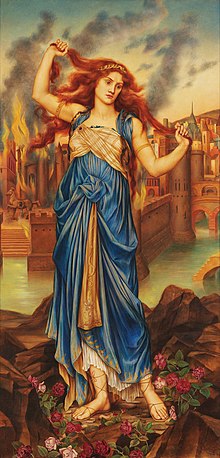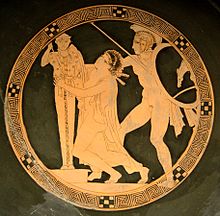This article is about the Greek mythological prophet. For other uses, see Cassandra (disambiguation).
In Greek mythology, Cassandra (Greek Κασσάνδρα, also Κασάνδρα)[1] was the daughter of King Priam and Queen Hecuba of Troy. Her beauty caused Apollo to grant her the gift ofprophecy. In an alternative version, she spent a night at Apollo's temple, at which time the temple snakes licked her ears clean so that she was able to hear the future (this is a recurring theme in Greek mythology, though sometimes it brings an ability to understand the language of animals rather than an ability to know the future).[2] When Cassandra refused Apollo's attempted seduction, he placed a curse on her so that her predictions and those of all her descendants would not be believed. She is a figure of both epic tradition and oftragedy.
Contents
[hide]History[edit]
Historically, Cassandra was the daughter of KingPriam (Priamos) and Queen Hecuba (Hekabe) and the fraternal twin sister of Helenus.
Cassandra was said to have had red hair kept in curls, blue eyes, and fair skin; she was very beautiful. She is portrayed as intelligent, charming, desirable, elegant, friendly, and gentle, but she was considered to be insane. Cassandra was described as the "second most beautiful woman in the world." Her beauty was even compared to that of Aphrodite and Helen of Troy.
In Mythic tradition, Cassandra's ability to hear the future, combined with Apollo's curse that she not be believed, created a source of endless pain and frustration to her. In some versions of the myth, this is symbolized by the god spitting into her mouth; in other Greek versions, this act was sufficient to remove the gift so recently given by Apollo, but Cassandra's case varies. From Aeschylus' Agamemnon, it appears that she has made a promise to Apollo to become his consort, but broke it, thus incurring his wrath: though she has retained the power of foresight, no one will believe her predictions.
While Cassandra foresaw the destruction of Troy (she warned the Trojans about the Trojan Horse, the death of Agamemnon, and her own demise), she was unable to do anything to forestall these tragedies since no one believed her. Coroebus and Othronus came to the aid of Troy out of love for Cassandra. Cassandra was also the first to see the body of her brother Hector being brought back to the city.
At the fall of Troy, she sought shelter in the temple of Athena, where she was violently abducted and raped by Ajax the Lesser. Cassandra was then taken as a concubine by King Agamemnon of Mycenae. Unbeknownst to Agamemnon, while he was away at war, his wife, Clytemnestra, had begun an affair with Aegisthus. Clytemnestra and Aegisthus then murdered both Agamemnon and Cassandra. Some sources mention that Cassandra and Agamemnon had twin boys, Teledamus and Pelops, both of whom were killed by Aegisthus.
Agamemnon by Aeschylus[edit]
In Aeschylus' Agamemnon, the king, treading the scarlet cloth laid down for him, walks offstage to his sure death at line 972. After the chorus's ode of foreboding, time is suspended in Cassandra's "mad scene", which does nothing to advance the action in any way.[3] She has been onstage, silent and ignored. Her madness that is unleashed now is not the physical torment of other characters in Greek tragedy, such as in Euripides' Heracles orSophocles' Ajax,[4] but she speaks, disconnectedly and transcendent, in the grip of her psychic possession by Apollo,[5] witnessing past and future events. "She evokes the same awe, horror and pity as do schizophrenics", an observer[6] has noted, "who often combine deep, true insight with utter helplessness, and who retreat into madness." Eduard Fraenkel remarked[7] on the powerful contrasts between declaimed and sung dialogue in this scene. The frightened and respectful chorus are unable to comprehend her. She goes to her inevitable offstage murder by Clytemnestra with full knowledge of what is to befall her.[8]
Modern adaptations[edit]
A modern psychological perspective on Cassandra is presented by Eric Shanower in Age of Bronze: Sacrifice. In this version, Cassandra, as a child, is assaulted by a priest of Apollo.
In the DC comic The Sandman, Delirium, one of The Endless, has some form of prophetic knowledge but due to her chaotic nature, her prophecies almost never make sense until it is too late and no other character recognizes them.[citation needed]
A similar situation occurred in Lindsay Clarke's novel The Return from Troy (presented as a reawakened memory), where a priest of Apollo forced himself upon Cassandra and was stopped only when she spat in his mouth. When the priest used his benevolent reputation to convince Priam that he was innocent of her wild claims, Cassandra subsequently went insane.
The story of Cassandra is also retold by German author Christa Wolf in Kassandra. She retells the story from the point of view of Cassandra at the moment of her death and uses the tale as an allegory for both the unheard voice of the woman writer and the oppression and strict censorship in East Germany.
Cassandra is the main protagonist of the eponymous play by the Ukrainian author Lesya Ukrainka.
The author Marion Zimmer Bradley wrote a fantasy novel called The Firebrand, which presents a story from Cassandra's point of view. Marcus Sedgwick's novel The Foreshadowing features a protagonist named Alexandra who has the gift of foresight, though she sees mainly others' pain and death.[citation needed]



Tidak ada komentar:
Posting Komentar